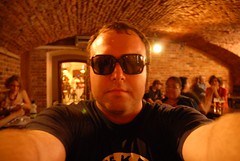Why can't we say "died"? Why do people pass? Pass sounds like a voluntary choice to me. You pass on seconds at a dinner table, you pass a road sign to where you're going while your distracted by the beautiful blonde in the BMW passing you, you pass the greay poupon, pass the carrots, you pass your glass for a refill, you pass on condoms because you're too drunk to keep it up with that much latex. In all these things pass is voluntary except when most people die. Now we can make an argument that suicides should be the model for voluntary death, but you know there's a sticky gray area there too.
I'm still uncomfortable with relying on the 12th definition of the verb form of pass in reference to a person's death. I might prefer the 1st definition of the word's noun form as being closer related to coins for Charon than the act of transition. However, why can't we say died or death? Is there something to permanent in those two words that there isn't in pass? Is passing away imply a passage to someplace? Is there a destination in pass that you don't get in death or died?
I've always been curious about this. I find it hard to use the term passed away, I just say died. I feel more comfortabl with the absolute nature of that phrase than with the nebulous and implied potentials with passing away. I don't like to think that my loved ones passed away, willingly or otherwise, and that they may be in some thick reality definied by the faithful and instituted by zealots in an afterlife church of eternal exclusivity. No, I want to think of them as having expired, used this flesh up and finally it or whatever passes for soul or spirit, relinquished it's grip and expired. That seems like an equally euphemised way of looking at something for which we have a perfectly good term, yet it still doesn't quite satisfy.
Why do we want to pass away? Why can't we just come to grips with dying? "The dead look so very dead when they're dead." wrote Sommerset Maugham in The Razor's Edge. The statement seems to plant the dead where they should be, not among the living, but dead, in a state other than living. If the path to that state weren't important, then they can't have passed into a state where they look very dead as the dead tend to be when they're dead. It seems that death, in this case, is evoked for three senses or means by which we understand the world: the dead (noun) look so very dead (appearance) when they're dead (being). Language vs. the appearance of reality vs. that thing in itself concept that Schoppenhauer talked so much about.
Perhaps we can find a reason for our need to put choice into the equation whose result is death: "The dead only know one thing: it's better to be alive." These words came from the internal monologue like narration of Mathew Modine's character in Full Metal Jacket as he stood over a pit full of corpses covered in lime. Private Joker muses that the state of death has a knwoledge in it, something that we can say is similar to willing passage, that the dead know something we the living don't. Is it that are privy to the great mystery of the beyond before we are? Is there a certainty in the state of being dead that the living only guess at, or in a complete abandonment of empirical rationality, embrace whole heartedly regardless of the possible dissapointment? The dead, if they knew that living was better, might make the choice of passage even more difficult to stomach.
The sad fact is that we need to pass, we need transition to represent something. As myth is as much to explain natural phenomenon as to place an individual into the constructed cosmology and realize the self in terms of "other" according to Jung, then death has to have a meaning and a continuity through human history. Our greatest fear is falling out of the thread, so we pass, from one thread to another, from memory to memory like a photograph carried through a sea of people. We have to have our loved ones pass from this place to the kingdom du jour so that we can still feel like potentn creatures capable of affecting positive changes in the world around, because there is a choice.
Tuesday, May 16, 2006
Subscribe to:
Post Comments (Atom)




No comments:
Post a Comment